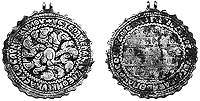 |
|
 |
The meaning of certain rituals
 These superstitions and practices were encountered at all levels of Late Byzantine society, whether political, economic, religious, or intellectual, and in all the social classes. The place
These superstitions and practices were encountered at all levels of Late Byzantine society, whether political, economic, religious, or intellectual, and in all the social classes. The place
 they held in society was that of a special form of religious faith and activity which was not accepted by Orthodox Christianity. The Byzantines were as firm in their belief in the existence of God as in the existence of good and evil spiritual forces in nature, which had the power to act independently of the control of God. Thus, they believed in God, but at the same time they believed in the "evil eye" and in spells; they carried little crosses with them to ward off evil, while some would leave their amulets under the stars overnight so that they might absorb the beneficial astral influences. They believed that their illness would be cured by burning fishbones, thus exorcising the demons that caused it, and by praying to God at the same time. Amulets bearing non-Christian symbols, such as those of
Medusa
or
Chnoubis
were considered to be the best protection for a woman during pregnancy and childbirth. they held in society was that of a special form of religious faith and activity which was not accepted by Orthodox Christianity. The Byzantines were as firm in their belief in the existence of God as in the existence of good and evil spiritual forces in nature, which had the power to act independently of the control of God. Thus, they believed in God, but at the same time they believed in the "evil eye" and in spells; they carried little crosses with them to ward off evil, while some would leave their amulets under the stars overnight so that they might absorb the beneficial astral influences. They believed that their illness would be cured by burning fishbones, thus exorcising the demons that caused it, and by praying to God at the same time. Amulets bearing non-Christian symbols, such as those of
Medusa
or
Chnoubis
were considered to be the best protection for a woman during pregnancy and childbirth.
Lacking, as they were in
the
required theological education, the Byzantines were not able to make a distinction between the supernatural power of God and that of other forces, nor were they interested in making this distinction, since these superstitions and practices, although forbidden, were an inseparable part of their daily life. The prohibition of certain rituals and practices and the distinction between Orthodox and non-Orthodox faith was made by specially qualified theologians who were in a position to understand the difference in accordance with the dogma of the Church. Although individuals
who carried out
such practices and their clients were tried before the Patriarchal Court and condemned, the punishments imposed were not particularly severe, as surviving records show. These beliefs spread from Byzantium to the Slav peoples, whose culture was strongly affected by them.
See also: Hesychasm
|